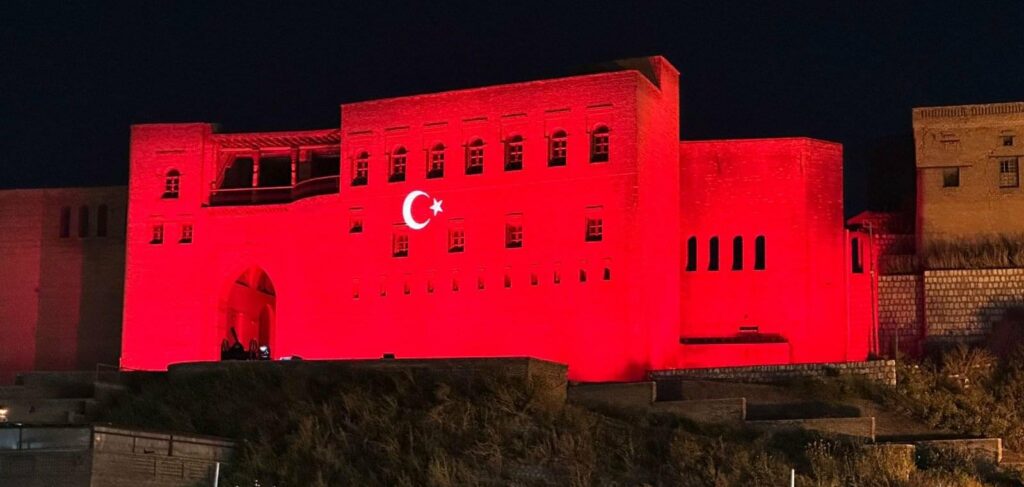Critics accuse the Kurdistan Democratic Party (KDP) and its leader, Iraqi Kurdistan’s President Nechirvan Barzani, of pandering to Turkish President Recep Tayyip Erdoğan by draping key landmarks, including the historic Erbil Citadel, with Turkish flags for Erdoğan’s visit.
Turkey is a major economic partner for northern Iraq’s autonomous Kurdish region, which has long exported oil through a pipeline that runs through Turkey and has trade ties worth billions.
Coming on the occasion of Erdoğan’s historic visit to Iraq after a 12-year absence, the act has sparked accusations by critics, mainly Kurds and pro-Kurdish activists, of the subjugation and betrayal of Kurdish interests in favor of Turkey, which has a contentious relationship with Kurdish groups both within its borders and in Iraq.
The Kurds are the largest ethnic minority in Turkey, making up around 18 percent of the population. The Kurds also have a sizable presence in Iran, Iraq and Syria.
They are one of the largest ethnic groups without a state and have a long history of suffering discrimination and violence in Turkey and other countries.
Erbil, capital #Kurdistan Region in Iraq, projects Turkish flag on its most important architectural heritage on evening before Erdoğan's visit. #Turkey is expanding its occupation of Kurdistan, killing your citizens and you please the occupying power's head of state like this? https://t.co/b1ApO7yQMV
— Frederike Geerdink (@fgeerdink) April 22, 2024
Journalist Frederike Geerdink expressed her dismay on X that the Turkish flag was projected onto the city’s most important architectural heritage on the eve of Erdoğan’s visit. Geerdink criticized the regional government for “pleasing the head of state of the occupying power,” implying that the Kurdish leadership puts diplomatic relations above the welfare of its people.
🔞⭕Turkey is a state sponsor of international terrorism, which has killed thousands of Kurds and committed many massacres. The government of Erbil and the Kurdistan Democratic Party raise Turkey’s terrorist flags, a provocative step. Where are the free Kurds? 🇹🇷👞👞🇹🇷👞🇹🇷 pic.twitter.com/OAVFTIehrF
— ضابط || Rojava security (@DalgashRasoul5) April 22, 2024
Fighting between the Turkish army and outlawed Kurdistan Workers’ Party (PKK) militants from Turkey has for decades spilled over into Iraqi Kurdistan, a rugged mountain region where both sides operate military bases — with civilians often caught in the crossfire.
President Erdoğan, having governed Turkey for over 20 years, has fostered key strategic links with Barzani, who has been in his position since 2019 after holding senior government positions for decades.
🚨Barzani sold Kurdistan to Turkey
The citadel in Hewler has been illuminated in the colors of the Turkish flag as a warm welcome to Erdogan's visit to the city.
This is not politics, this is business pic.twitter.com/Z9GppmoVJK
— Raman Nasirizadeh (@iamramanzada) April 22, 2024
Raman Nasirizadeh, a Kurdish activist, accused Barzani of “selling Kurdistan to Turkey” and described the warm welcome for Erdoğan as a transaction and not a real policy. The display of Turkish flags, Nasirizadeh said, was more of a commercial act than a diplomatic gesture.
Erbil kalesine Türk bayrağı yansıtmanın bir savunusu olamaz. İsterseniz kendinizi kandırmaya devam edin ama bu basit yalakalıkların diplomasi ya da nezaketle alakası yok. Sizin adınızı anmaktan bile imtina eden Türkler, siz bayrak astınız diye size daha iyi davranmayacaklar.
— ibrahim halil baran (@ixbaran) April 22, 2024
Activist İbrahim Halil Baran criticized the local leadership for what he sees as empty diplomacy and warned that Turkish recognition and better treatment of Kurds would not follow from such displays of submission.
Erdoğan Erbil'i ziyaret edecek diye Kürdistan'ın dört bir yanını Türk bayrakları ile donatmışlar. Bu yetmez bir de tarihi Erbil kalesini Türk bayrağı ile kaplamışlar. Diplomaside nezaketin yeri vardır. Bu anlaşılır. Ancak bu diplomasiyi de aşan bir duruma dönüşmüş durumda. Deyim… pic.twitter.com/95tBE3Nk2i
— Fehim Işık (@Fehim_Isik) April 22, 2024
Journalist Fehim Işık echoed this sentiment, condemning the decoration of Kurdistan with Turkish flags as going beyond diplomatic niceties and degenerating into subservience. Işık’s remarks reflect a broader sentiment that Barzani’s government is compromising Kurdish identity and sovereignty in exchange for maintaining favorable relations with Turkey.
What else can explain this except full submission to your coloniser! #Barzani welcomes #Erdogan’s visit to Iraq by projecting the Turkish state flag on the Erbil citadel. This signifies nothing but the Barzani betrayal of the Kurds. It demonstrates nothing but the readiness of… pic.twitter.com/goP9q6yFDH
— Rojîn Mûkrîyan (@RojinMukriyan) April 22, 2024
Rojîn Mûkrîyan, a political expert on Kurdish studies, expressed on X that she sees the situation as complete “submission to your coloniser.” She accused Barzani of betraying the Kurdish people by supporting Erdoğan’s policies, which she described as genocide against the Kurds.
This is the KRG capital, covering the 8000-years old Erbil citadel with the Turkish flag to welcome Erdogan.
Erdogan for Kurds is what Putin for Ukrainians or Netanyahu for Palestinians.
Maybe EU-based Kurdish nationalists have a word for their godfather nationalist Barzani? pic.twitter.com/KHUCMwFjlk
— Kamal Chomani (@KamalChomani) April 22, 2024
Journalist Kamal Chomani compared Erdoğan’s influence on the Kurds to that of Russian President Vladimir Putin on the Ukrainians and Israeli Prime Minister Benjamin Netanyahu on the Palestinians and demanded answers from pro-Barzani Kurds.

